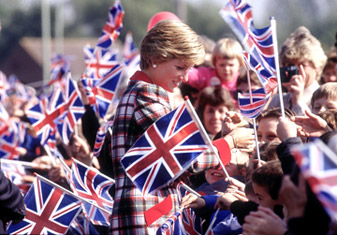
(4 of 4)
The Political Princess
Diana's body was transported to Westminster Abbey on a gun carriage. Arbiter says that's a detail of Diana's funeral that troubled Blair's communications chief, Alastair Campbell, and his team. The vehicle had been chosen because, unlike a hearse, it would be open to the crowds. To the palace it also seemed appropriate: Diana had, after all, been the honorary Colonel-in-Chief of six regiments.
Yet Diana's last, passionate campaign was distinctly unmilitary: she called for the abolition of land mines. She had visited Angola with the British Red Cross in January 1997, angering some Conservative MPs, who thought she was showboating. Peter Viggers, a Tory member of the Commons Defence Select Committee, said: "This is an important, sophisticated argument. It doesn't help simply to point at the amputees and say how terrible it is." Undaunted, Diana spoke at a conference on land mines and made a second fact-finding trip, to Bosnia.
Few would have predicted such engagement from the plummy girl who emerged onto the public stage in 1980 as Charles' latest squeeze. The royal wedding in 1981 — with Diana's endless train, the pages and flower girls, the choirs and coaches — was widely seen at the time as a reaffirmation of tradition in Britain, a throwback to an age when nobility and pomp held the nation in thrall. That it should have taken place during Margaret Thatcher's first term only added to the idea that Britain was becoming a more conservative society, and that Diana, the girl from the old aristocracy who had married into royalty, epitomized it.
Yet the Princess was never in tune with the Iron Lady. "Who is society? There is no such thing," Thatcher told Woman's Own magazine in 1987. "There are individual men and women and there are families." Thatcher's bracing doctrine of personal responsibility was always at odds with Diana's faith in the power of redemptive understanding, of allowing the weak to be weak. Her belief system very much included an entity called society, which rejected and marginalized people. "Someone has got to go out there and love people and show it," she said in her BBC interview.
By the time the Princess died, Thatcher was long gone, her pallid successor John Major was vanquished and Blair was in 10 Downing Street, with a huge popular mandate to build a more inclusive, caring Britain. That agenda echoed Diana's. The Princess had two secret meetings with Blair before his election. According to Alastair Campbell's recently published diaries, she told the intermediary who set up the meetings that "she would like to help [Labour] if she could." Diana had certainly made her mark on Campbell, who recorded that the Princess "had perfect skin and her whole face lit up when she spoke and there were moments when I had to fight to hear the words because I'm just lost in the beauty." Today Campbell has a more sober assessment: "She was very small-p political. I have no idea if she would have ended up taking some kind of unofficial role with a Labour government, but I am sure she would have found a way of harnessing her own skills and popularity to the sense of Britain as a more modern and compassionate country."
We will never know if she would have achieved such a dispensation. But the fact that she was — undeniably — on occasion manipulative, deceitful and self-centered should not blind us to the fact that, during her 17 years in the limelight, she had grown as Britain had grown, changed as Britain had changed, and that by the time she died she had something increasingly vital to offer. Arbiter recalls a strange, muted, mournful night after the Princess died when he encountered a group of wheelchair users on their way to lay flowers at Kensington Palace. "They were saying, 'Who's going to speak for us, now?' They had a point. The disabled: who's going to speak for them? The AIDS patients: who's going to speak for them? The drug addicts, the down-and-outs, the homeless, the elderly? She was their voice and drew attention to their plight." Arbiter pauses. "She'd have made a good Queen, you know. But that's it. She's gone." Gone? As anyone who knows anything about the strains that make up modern Britain will tell you, that is very far from true.
